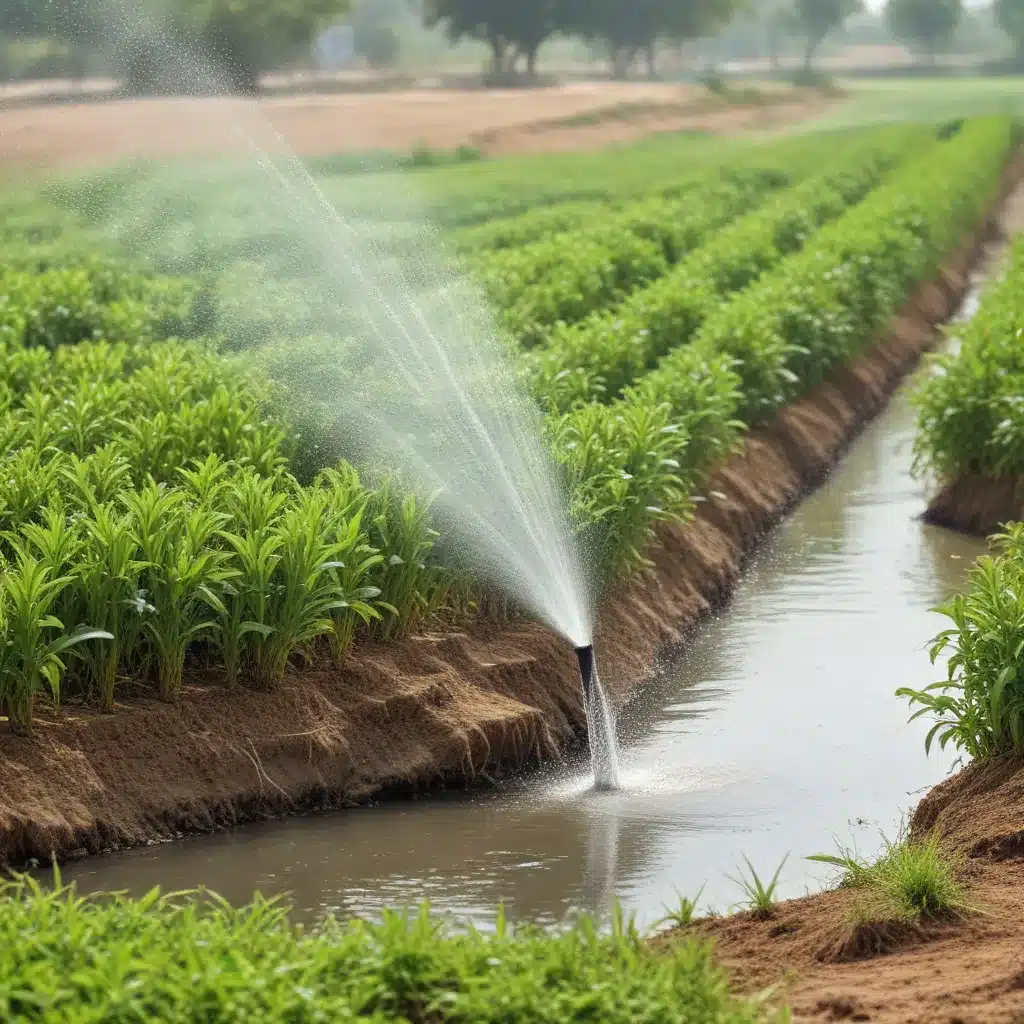
Addressing the Water Crisis through Innovative Irrigation Solutions
Hyderabad, the bustling city of the Deccan Plateau, faces a pressing challenge in its agricultural sector – the need for sustainable irrigation practices to combat the looming water crisis. As the region grapples with limited water resources and the growing demands of a burgeoning population, the importance of improving water use efficiency in agriculture has never been more paramount.
The Urgency of Water Conservation in Hyderabad’s Agriculture
Hyderabad’s agricultural landscape is a tapestry of diverse crop cultivation, from water-intensive rice to drought-tolerant millets. However, the reliance on traditional irrigation methods, such as flood irrigation, has led to significant water waste and environmental degradation. The export of virtual water through the trade of water-intensive crops has further exacerbated the situation, posing a threat to the long-term sustainability of the region’s food production.
To address this challenge, a comprehensive approach is required – one that integrates innovative irrigation technologies, sustainable farming practices, and community engagement. By harnessing the power of cutting-edge solutions and fostering collaborative efforts, Hyderabad can reshape its agricultural landscape, ensuring a future where water scarcity is no longer a looming threat.
Innovative Irrigation Technologies: Transforming Hyderabad’s Farms
Across Hyderabad’s farmlands, a revolution in irrigation practices is taking root, driven by the adoption of innovative technologies that optimize water usage and enhance crop yields. These solutions are not only improving the efficiency of water utilization but also contributing to the overall sustainability of the region’s agricultural sector.
Drip Irrigation Systems: One such technology gaining traction is the implementation of drip irrigation systems. These advanced irrigation methods deliver water directly to the plant’s root zone, minimizing evaporation and surface runoff. By reducing water consumption by up to 60% compared to traditional flood irrigation, drip irrigation systems are proving to be a game-changer in Hyderabad’s water-scarce environment.
Smart Irrigation with IoT: The integration of the Internet of Things (IoT) and smart irrigation technologies is revolutionizing water management in Hyderabad’s farms. Sensor-based irrigation systems, powered by real-time data and AI-powered analytics, can precisely monitor soil moisture levels, weather conditions, and crop water requirements, automatically adjusting irrigation schedules to optimize water usage.
Alternate Wetting and Drying (AWD): Another innovative approach gaining popularity is the Alternate Wetting and Drying (AWD) technique, which involves strategically controlling the water levels in rice fields. By allowing the soil to partially dry out between irrigation cycles, AWD can reduce water consumption by up to 30% without compromising yields, making it a viable option for water-intensive rice cultivation.
Precision Farming with Satellite Monitoring: Cutting-edge satellite-based monitoring and precision farming technologies are empowering Hyderabad’s farmers to make data-driven decisions. Leveraging satellite imagery and advanced analytics, farmers can optimize resource allocation, monitor crop health, and fine-tune irrigation schedules, leading to significant improvements in water use efficiency.
Sustainable Farming Practices: Enhancing Water-Use Efficiency
In addition to technological innovations, Hyderabad’s agricultural community is also embracing sustainable farming practices that contribute to improved water management and overall environmental sustainability.
Direct Seeded Rice (DSR): The adoption of Direct Seeded Rice (DSR) is gaining momentum in Hyderabad. This approach involves directly sowing rice seeds in the field, eliminating the need for water-intensive nursery preparation and transplanting. DSR can reduce water usage by up to 30% while also reducing labor requirements and greenhouse gas emissions.
System of Rice Intensification (SRI): The System of Rice Intensification (SRI) is another water-efficient technique being implemented in Hyderabad. SRI focuses on optimizing plant spacing, soil aeration, and water management, leading to improved yields while reducing water consumption by up to 50%.
Cover Cropping and Mulching: Innovative farming practices, such as cover cropping and mulching, are gaining traction in Hyderabad’s agricultural sector. These techniques help retain soil moisture, suppress weed growth, and improve overall soil health, contributing to enhanced water use efficiency.
Cultivating a Culture of Water Stewardship
Sustainable irrigation practices in Hyderabad’s agriculture cannot be achieved in isolation. The success of these efforts depends on the active engagement and support of the local community, policymakers, and stakeholders.
Community Outreach and Capacity Building: Joint Action for Water, in collaboration with local organizations, is spearheading community outreach and capacity-building initiatives to educate farmers on the importance of water conservation and the adoption of sustainable irrigation practices. Through training programs, demonstration plots, and knowledge-sharing platforms, Hyderabad’s farming community is empowered to become active stewards of water resources.
Policy Frameworks and Incentives: Recognizing the urgency of the water crisis, the Telangana state government has implemented various policy frameworks and incentive schemes to encourage the adoption of water-efficient technologies and sustainable farming methods. These initiatives, such as subsidies for drip irrigation systems and financial support for precision farming, are catalyzing the transformation of Hyderabad’s agricultural landscape.
Collaborative Efforts and Knowledge Sharing: The Joint Action for Water platform serves as a hub for collaboration, knowledge sharing, and the dissemination of best practices. By fostering partnerships between farmers, researchers, policymakers, and agricultural organizations, innovative solutions are being scaled up and replicated across Hyderabad’s diverse farming communities.
Towards a Water-Secure Future for Hyderabad’s Agriculture
As Hyderabad navigates the challenges of water scarcity, the agricultural sector has emerged as a crucial battleground. Through the adoption of innovative irrigation technologies, the implementation of sustainable farming practices, and the cultivation of a culture of water stewardship, the city is charting a path towards a more water-secure and resilient agricultural future.
By harnessing the power of cutting-edge solutions and cultivating a collaborative, community-driven approach, Hyderabad’s agricultural sector can not only withstand the pressures of water scarcity but also serve as a model for sustainable water management across India. The journey towards water-efficient agriculture is a complex one, but with the unwavering commitment of the city’s farmers, policymakers, and stakeholders, Hyderabad is poised to emerge as a beacon of hope in the face of the global water crisis.

